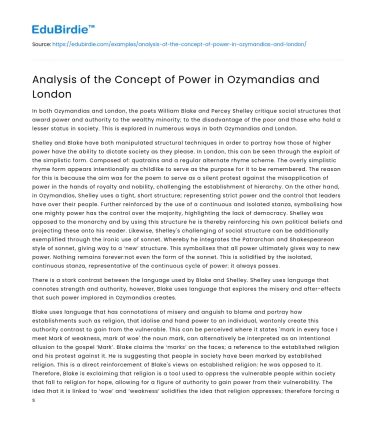In both Ozymandias and London, the poets William Blake and Percey Shelley critique social structures that award power and authority to the wealthy minority; to the disadvantage of the poor and those who hold a lesser status in society. This is explored in numerous ways in both Ozymandias and London.
Shelley and Blake have both manipulated structural techniques in order to portray how those of higher power have the ability to dictate society as they please. In London, this can be seen through the exploit of the simplistic form. Composed of: quatrains and a regular alternate rhyme scheme. The overly simplistic rhyme form appears intentionally as childlike to serve as the purpose for it to be remembered. The reason for this is because the aim was for the poem to serve as a silent protest against the misapplication of power in the hands of royalty and nobility, challenging the establishment of hierarchy. On the other hand, in Ozymandias, Shelley uses a tight, short structure; representing strict power and the control that leaders have over their people. Further reinforced by the use of a continuous and isolated stanza, symbolising how one mighty power has the control over the majority, highlighting the lack of democracy. Shelley was opposed to the monarchy and by using this structure he is thereby reinforcing his own political beliefs and projecting these onto his reader. Likewise, Shelley's challenging of social structure can be additionally exemplified through the ironic use of sonnet. Whereby he integrates the Patrarchan and Shakespearean style of sonnet, giving way to a ‘new’ structure. This symbolises that all power ultimately gives way to new power. Nothing remains forever:not even the form of the sonnet. This is solidified by the isolated, continuous stanza, representative of the continuous cycle of power: it always passes.
Save your time!
We can take care of your essay
- Proper editing and formatting
- Free revision, title page, and bibliography
- Flexible prices and money-back guarantee
There is a stark contrast between the language used by Blake and Shelley. Shelley uses language that connotes strength and authority, however, Blake uses language that explores the misery and after-effects that such power implored in Ozymandias creates.
Blake uses language that has connotations of misery and anguish to blame and portray how establishments such as religion, that idolise and hand power to an individual, wantonly create this authority contrast to gain from the vulnerable. This can be perceived where it states 'mark in every face I meet Mark of weakness, mark of woe' the noun mark, can alternatively be interpreted as an intentional allusion to the gospel ‘Mark’. Blake claims the ‘marks’ on the faces; a reference to the established religion and his protest against it. He is suggesting that people in society have been marked by established religion. This is a direct reinforcement of Blake's views on established religion: he was opposed to it. Therefore, Blake is exclaiming that religion is a tool used to oppress the vulnerable people within society that fall to religion for hope, allowing for a figure of authority to gain power from their vulnerability. The idea that it is linked to ‘woe’ and ‘weakness’ solidifies the idea that religion oppresses; therefore forcing a societal reliance on religion, reinforcing the authority of one supreme figure over a majority. The double meaning of ‘mark’also suggests that people are branded with their place in society; tied in with the alliteration of the ‘w’ sound in ‘weakness’ and ‘woe’ connote misery and inability to challenge authority. As a result reflecting the poet's intentions: to challenge established social structures that give power to the wealthy and profit off the most vulnerable in society. This is also clearly distinguished throughout Ozymandias, however, Shelley demonstrates the after-effects. The deeply negative connotations of ‘sunk’ 'shattered' ‘visage’ portray impermanence and suggests a sense of replacement, therefore suggesting that political power never lasts. However, this contrasts starkly with the language that Ozymandias himself uses. Exemplified here in: 'My name is Ozymandias, king of kings: Look on my works, ye mighty, and despair!'. The adjective 'mighty' is imposing and intimidating along with the hyperbole and religious language; it portrays the king's arrogance. This creates a sense of irony as the reader knows that power is not eternal, as portrayed through the use of contrasting language. Therefore reinforcing and proving the poet's intentions. This allows for the audience to adopt Shelley's political views.
Later on, Blake's criticism of established religion and social structure that hand power is further developed where it states: 'Every blackning church appals'. The subtle juxtaposition of imagery of 'blackning', which connotes decay, corruption and misery with ‘church' which has connotations of purity, innocence and holility. Furthermore pushes forward Blake’s beliefs of how the church and established social structure use the vulnerable to gain societal power. However, in Ozymandias, Ozymandias himself uses religious imagery for social gain. For instance : 'King of kings', which is a biblical allusion, to reinforce his own power. He is masking himself behind religion in an attempt to gain power and control over the socially vulnerable; this is exactly what Blake accuses the church of doing.
To conclude, both poets employ structure and form to present their ideas about power. Although both poems are similar and contrast to each other in many ways, they both prove the misery and corruption social structures bring to society.






 Stuck on your essay?
Stuck on your essay?

